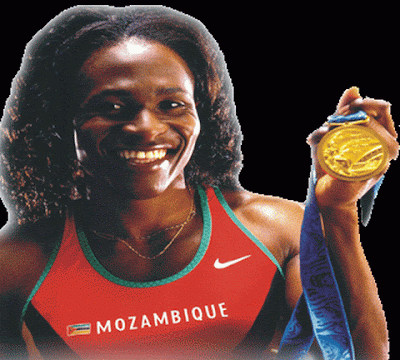
We weren't close, that's for sure. Maria Mutola was the greatest female 800 meter runner of all time. When she moved from Mozambique to Eugene, Oregon (ok, it was Springfield, to be precise) at the age of 16, she was already famous in certain quarters. The reason for her teenage fame? Running. She went to the 1988 Olympics in the 800m run at the age of 15 representing Mozambique.
It was common enough in gymnastics for girls of that age to make the Olympics, but not in track and field. Even though her performance in the Seoul Olympics was remarkable only for her age, she was destined for greatness and everybody knew it.
A strange quirk of fate caused her to move to Eugene in 1990 where she attended Springfield High School whose track coach, Margo Jennings, was a friend. Soon Margo made the wise choice to have Maria work out with older, male runners with experience on the international circuit. Maria's talents were too much for her high school teammates. Margo turned to my running partner, Ed Spinney, a sub-four minute miler who had competed in Europe before becoming an attorney in Eugene. Ed worked in my office for almost a decade and I had the chance to run with Ed Spinney on a few thousand occasions. Although as a runner I was more enthusiastic than talented, in the process of running with Ed, I became a lot tougher and faster, but never nearly as fast as Ed.
This happenstance permitted me to meet Maria and train with her on occasion. There's something about running together for miles that breaks down barriers, and over time, I got to know her in spite of her shyness. I had no chance to keep up with her in shorter distances, but on longer training runs, I held my own.
In the years that followed, she won Olympic medals, including the gold medal in the 2000 Sydney Olympics. She won many world championships. She was the top-ranked 800 meter runner in the world for the better part of her 16 year career, and when she finally decided to retire from competitive running last summer, her accomplishments were so far beyond those of every other 800 meter runner in history that no rationale person could debate the issue.
Several times in the height of her career I had the chance to enjoy casual evenings with her and a few others over dinner at the home of her sometime trainer, Jack Scott. Although at that point, she was financially secure and internationally famous in track, her sense of self had not become inflated.
Maria's physique set her apart from others, with shoulders remarkably broad and rippling with muscle. Running foes tried to diminish her accomplishments by hinting at steroid use, pointing to her musculature as proof. They hadn't seen what I had---she was built that way at age 16, long before she would have had access to performance enhancing drugs.
The longevity of her career and the steadiness of her performances on the track were unparalleled. She ran every race as though arriving at the finish line first was her purpose for living. Such competitiveness, such passion for victory, is rare because the price one must pay in terms of physical suffering is considerable. Most people cannot will themselves to go there ever, and those who manage to summon the ultimate effort on occasion cannot achieve such effort with the consistency, the single-mindedness of purpose, that became Maria's trademark.
In high school, attempts to prevent her from competing at the high school level were made, successfully, and the memory of this and other scornful acts directed at this gifted child from Africa sickens me still. No doubt, such early encounters with people who tried to marginalize her helps to account for both her shyness and her tenacity.
I don't know what retirement holds for Maria, but I suspect she will give as much back to the people of Mozambique as possible. She is a hero there, Mozambique's only international sporting celebrity, and Maria is not one to ignore her roots, which explains why she moved from her comfortable existence in my community back to Africa. I consider myself quite fortunate to have met someone as remarkable as Maria Mutola. Thank you, Maria, for the memories of watching you in competition, and for the opportunity to know the equally splendid person behind the championship performances.







